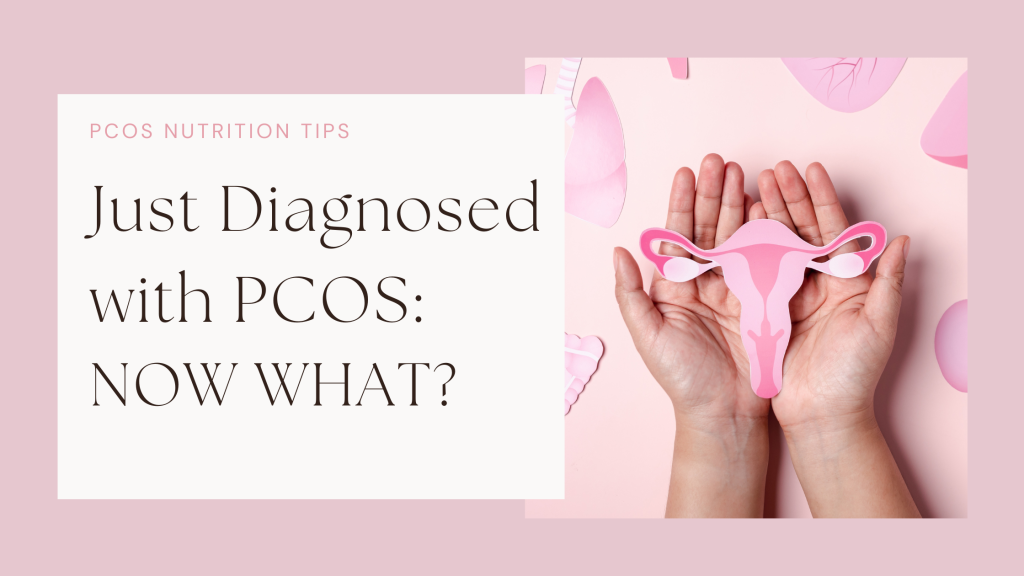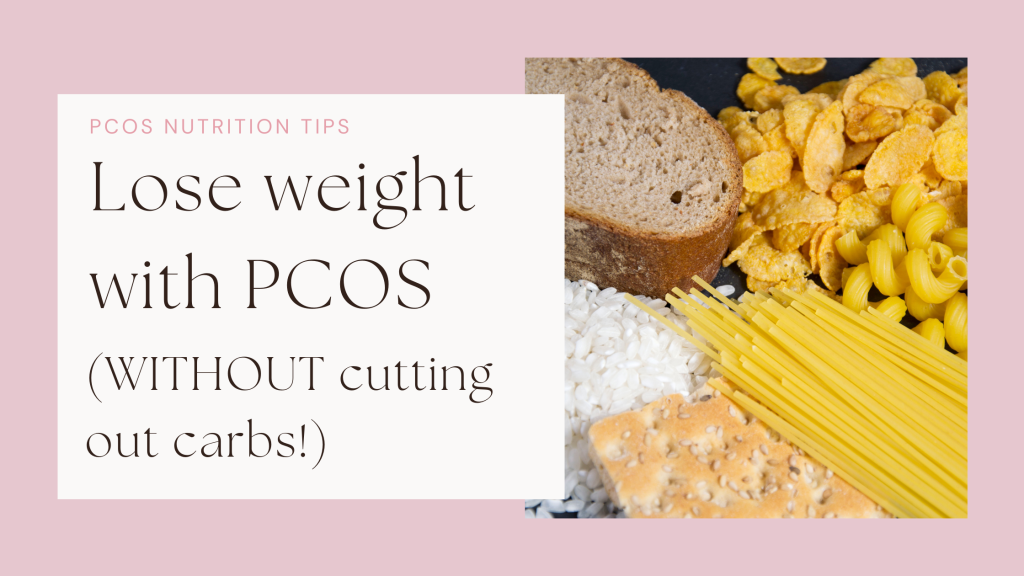If you’ve just been diagnosed with PCOS, overwhelmed probably doesn’t even begin to describe how you’re feeling! As a dietitian who has also been diagnosed with PCOS, I’ve been in your shoes! My goal is to help you understand PCOS, what causes it, and what your next steps should be as someone newly diagnosed!
What Is PCOS?
PCOS, or Polycystic Ovary Syndrome, is a common endocrine disorder that affects roughly 1 in 10 women. Your endocrine system regulates your hormones, so when there’s a disruption in this system, it can lead to hormonal imbalances. PCOS affects not only your reproductive hormones but also your metabolic hormones, influencing things like fertility, weight, and more.
PCOS is typically diagnosed using the Rotterdam Criteria, which require at least two of the following:
- Irregular or absent periods
- High levels of androgens (male hormones), seen through lab results or physical signs like acne, oily skin, unwanted hair growth, or hair thinning
- Polycystic ovaries on an ultrasound (these aren’t true “cysts” but immature follicles)
These hormonal imbalances can manifest as irregular periods, difficulty managing weight, acne, unwanted hair growth, and fertility challenges. They can also increase your risk for conditions like type 2 diabetes and heart disease. Clearly, these hormones play a significant role in overall health.
What Causes PCOS?
While the exact cause of PCOS remains unknown, here’s what we do know:
- It’s not your fault! PCOS isn’t caused by poor diet, lack of exercise, or your weight. This is important to remember! Yes, poor diet and lifestyle habits can worsen symptoms, but they aren’t the cause of PCOS. A lot of my clients come to me feeling so ashamed and like it’s all their fault. Not true!!
- Genetics play a role. If someone in your family has PCOS, you’re more likely to develop it too.
- Prenatal exposure to high levels of androgens may increase the likelihood of developing PCOS.
Although there’s currently no cure, it’s absolutely possible to manage PCOS with the right tools and strategies. Let’s explore your next steps.
Your First Steps After a PCOS Diagnosis
Step 1: Compile Your Lab Work
Understanding what causing your symptoms is critical because the hormone imbalance with PCOS can stem from multiple things. The most common are insulin resistance, inflammation, and excess stress. And looking over your bloodwork can help identify which of these is triggering your hormone imbalance.
This is why there is no one-size-fits-all treatment for PCOS. Knowing what’s triggering your symptoms will help us know exactly how to treat your PCOS so you don’t waste your time on interventions that get you nowhere. So first, you’ll need to gather your lab results.
Key labs to compile include:
- Fasting insulin
- HgA1c
- Testosterone
- Thyroid levels
- Lipid panel
- DHEA or DHEA-s
If your journey has been anything like mine, your lab results are probably scattered throughout multiple clinics and medical charting systems. Having these labs in one place will make it easier to identify patterns and areas of concern. Be sure to check out my free PCOS Lab Tracker to help you organize and track your lab results.
Step 2: Start Journaling Your Food Intake
It’s no secret that diet plays a huge role in managing PCOS, and most women want to dive right into cutting out carbs or sugar (although you do NOT have to cut out carbs if you PCOS!) But before you completely overhaul your diet, it’s helpful to see where you’re starting from.
This is where food journaling, or food tracking, can be helpful! This is usually the first thing I recommend my clients start with because it helps us make sure you’re getting the nutrition your body needs (with protein and fiber being two key nutrients they are usually lacking!)
Some key benefits to food journaling are:
- Help you become more aware of your current eating habits
- Help identify where the gaps are in your nutrition
- Keep you accountable as you work on improving your nutrition
I and my clients love food journaling with the Cronometer app. Their free version can provide a much better nutrition analysis of your intake than other apps, providing insight on protein, fiber, and even micronutrients!
I also love that it gives you a breakdown of your meals as well. For PCOS I usually recommend aiming for at least 25-30g protein and no more than 45-60g of carbs at each meal. Chronometer makes it super easy to track that!

Step 3: Get Help from a PCOS Healthcare Professional
Navigating PCOS can be overwhelming and exhausting. Not to mention incredibly isolating! But you do NOT have to do it alone. Partnering with a professional healthcare provider can provide clarity and guidance tailored to your needs.
- Find the right experts: Consider working with an endocrinologist, reproductive health specialist, or PCOS dietitian (like me!) who has experience helping others manage the condition.
- Develop a personalized plan: A professional can help you interpret your lab results, address root causes like insulin resistance or inflammation, and create an actionable plan that fits your lifestyle and goals.
- Get emotional support: Don’t underestimate the value of therapists or counselors who can help you manage the mental and emotional challenges of PCOS.
Don’t just rely on random advice you get from strangers in a Facebook group or on Reddit. Work with a trusted professional so you can be sure you’re making informed decisions and not relying on generic advice.
What Your Next Steps with a New PCOS Diagnosis
Now you hopefully have a better understanding of PCOS and what your next steps should be. Start with step 1 of compiling your lab work and then work your way through the other steps.
And if you want a complete breakdown of what to eat to naturally manage PCOS, you’ll definitely want to check out this article here!
Hi! I’m Hannah, your PCOS dietitian! I empower women with PCOS to eat balanced without restrictive diets so they can lose weight and feel their best. Whether through practical tips or grace-filled encouragement, I’m here to guide you every step of the way!



